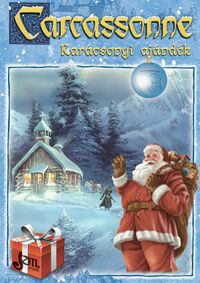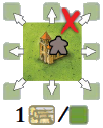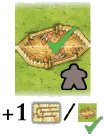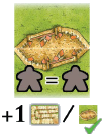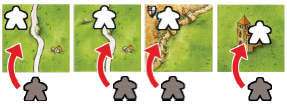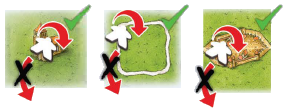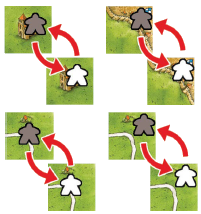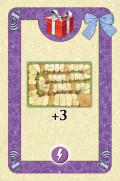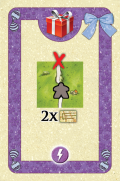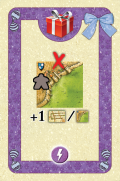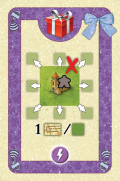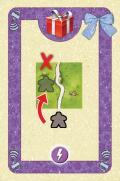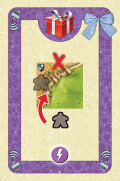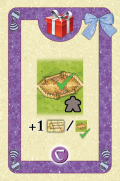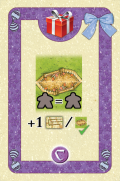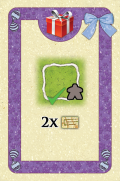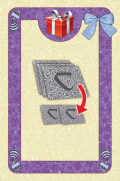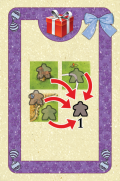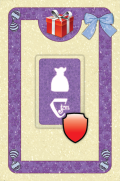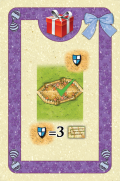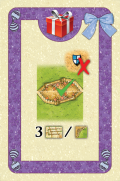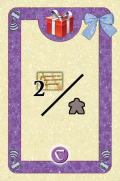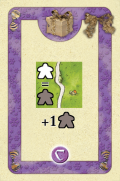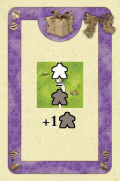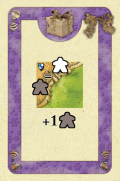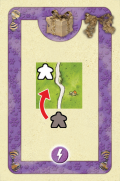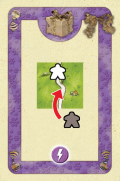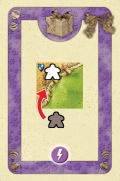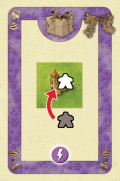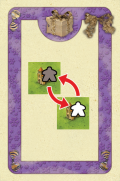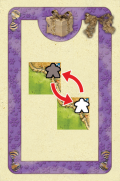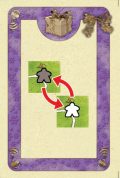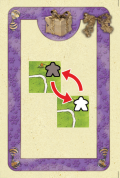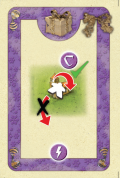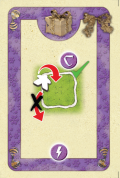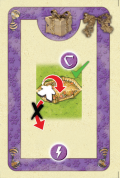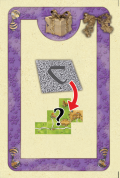Christmas Present
What is it? It happens once every year, it's cold, everything is covered in snow and the whole world is decorating pine trees. Shall I tell you the answer? Of course, it is Christmas.
This is when millions of gifts find their owners. They are very happy with some of them, but sometimes the feeling "they shouldn't have opened the package" overwhelms the person. In this add-on players will receive gifts and not all of them will be happy ones (at least for the other players).
General info and comments
Christmas Present was released exclusively to the Hungarian market by Piatnik in December 2013. It was published through JEM Magazine's website as a print-and-play expansion.[1]
The original Hungarian rules and artwork are available here:
Thanks to Rachel Anthony-Rowlands and Leven for providing corrections to our translation.
Contents
- 64 cards: 2 decks of 32 cards each (the Cloister deck and the Roadside deck) with differentiated backs.
Rules
The basic rules of Carcassonne do not change, and the Christmas Present expansion can be used with all expansions released so far.
Preparation
At the start of the game, separate the cards into two decks according to their distinct card backs (Cloister and Roadside), then shuffle each deck and place them face down within reach of all players.
Gameplay
1. Placing a tile
Drawing a card
Players take turns drawing tiles according to the rules of the basic game and place them down, following the usual rules.
When a player places a tile adjacent to another player's cloister, they may draw the top card from the Cloister deck and either activate it immediately (if the card allows or requires immediate activation) or place it into their hand (if the card allows or requires activation later).
When a player places a tile that contains only roads, they may then draw the top card from the Roadside deck and either activate it immediately (if the card allows or requires immediate activation) or place it into their hand (if the card allows or requires activation later).
Activating a card
The current player can activate several cards in a row in a turn. Players can only play the cards in their hands in their own turn (except for the card that protects from a Roadside card).
The activated cards are placed in a discard pile once used. [2]
Each player can have a maximum of 5 cards of both card types in their hand at the same time, they keep these a secret from the others. At the end of their turn, players must discard excess cards from their hand.
At the end of the game, the cards that can be played must be revealed in player order (those with the Carcassonne symbol), then the cards that can be used during the game can no longer be used (those with the lightning symbol or those with no symbol).
Description of the cards
Cloister deck
These cards are activated when drawn and are then added to the discard pile.
A lightning bolt symbol (![]() ) is placed at the bottom of these cards.
) is placed at the bottom of these cards.
These cards can be activated at any time during the game and are then added to the discard pile. There is no symbol at the bottom of these cards.
These cards are activated at the end of the game.
A Carcassonne mark (![]() ) is placed at the bottom of these cards.
) is placed at the bottom of these cards.
Roadside deck
These cards are activated when drawn and are then added to the discard pile.
A lightning bolt symbol (![]() ) is placed at the bottom of these cards.
) is placed at the bottom of these cards.
Note: In a cloister, you can only have more than one monk by using a Cloister card. [13]
These cards can be activated at any time during the game and are then placed in the discard pile. There is no mark at the bottom of these cards.
This card is activated at the end of the game.
A Carcassonne mark (![]() ) is placed at the bottom of the card.
) is placed at the bottom of the card.
Card Distribution
Total Cards: 64
Cloister Deck
Roadside Deck
Footnotes
For Icons explanation and licensing please visit Icons page.
- ↑
 The concept is so similar to
The concept is so similar to  The Gifts, that it seems very likely that this expansion served as the inspiration for that one, though this expansion has many more cards and abilities.
The Gifts, that it seems very likely that this expansion served as the inspiration for that one, though this expansion has many more cards and abilities.
- ↑
 When there are no cards left to draw, the discard pile is not re-shuffled.
When there are no cards left to draw, the discard pile is not re-shuffled.
- ↑
 The active player will choose and immediately score an uncompleted road where the player has the majority. The scoring will be performed as if after the game but considering 2 points per tile. The followers on the road will be removed.
The active player will choose and immediately score an uncompleted road where the player has the majority. The scoring will be performed as if after the game but considering 2 points per tile. The followers on the road will be removed.
- ↑ 4.0 4.1 4.2
 After scoring, the followers on the feature are returned to their owners with these cards.
After scoring, the followers on the feature are returned to their owners with these cards.
 Question: The three cards shown below cause an immediate scoring affecting a road/city/monastery. Does this scoring cause the followers on the road/city/cloister to return to their players?
Question: The three cards shown below cause an immediate scoring affecting a road/city/monastery. Does this scoring cause the followers on the road/city/cloister to return to their players?
- ↑
 The active player will choose and immediately score an uncompleted city where the player has the majority. The scoring will be performed as if after the game but considering 2 points per tile (+1 point per tile at the end of the game). The followers in the city will be removed.
The active player will choose and immediately score an uncompleted city where the player has the majority. The scoring will be performed as if after the game but considering 2 points per tile (+1 point per tile at the end of the game). The followers in the city will be removed.
- ↑
 The active player will choose and immediately score an uncompleted cloister where the player has the majority (there may be several followers on a cloister with this expansion). The scoring will be performed as if after the game but considering 1 point per tile except for the tile with the cloister. The followers on the cloister will be removed.
The active player will choose and immediately score an uncompleted cloister where the player has the majority (there may be several followers on a cloister with this expansion). The scoring will be performed as if after the game but considering 1 point per tile except for the tile with the cloister. The followers on the cloister will be removed.
- ↑
 The active player will score a completed road forming a loop where the player has the majority. The scoring will be performed as usual but considering 2 points per tile.
The active player will score a completed road forming a loop where the player has the majority. The scoring will be performed as usual but considering 2 points per tile.
- ↑
 If the active player uses a Roadside card against you, you may use this card to cancel the action even if it not your turn.
If the active player uses a Roadside card against you, you may use this card to cancel the action even if it not your turn.
- ↑
 The active player will score a completed city with pennants where the player has the majority. The scoring will be performed as usual but considering 2 points per tile and 3 points per pennant (i.e. +1 point per pennant).
The active player will score a completed city with pennants where the player has the majority. The scoring will be performed as usual but considering 2 points per tile and 3 points per pennant (i.e. +1 point per pennant).
- ↑
 The active player will score a completed city without pennants where the player has the majority. The scoring will be performed as usual but considering 3 points per tile (i.e. +1 point per tile).
The active player will score a completed city without pennants where the player has the majority. The scoring will be performed as usual but considering 3 points per tile (i.e. +1 point per tile).
- ↑
 If two features are joined together and one has rotated followers, the followers from the other are also rotated.
If two features are joined together and one has rotated followers, the followers from the other are also rotated.
- ↑
 The feature and any associated bonuses will be evaluated when the feature is completed, including any temporary modifiers (e.g. scoring tiles, mage, witch...) or bonuses (e.g. the fairy scoring bonus, Markets of Leipzig bonuses, watchtowers...). At the end of the game, the players will receive these points for the feature. You may need to jot down all these deferred points to avoid forgetting them.
The feature and any associated bonuses will be evaluated when the feature is completed, including any temporary modifiers (e.g. scoring tiles, mage, witch...) or bonuses (e.g. the fairy scoring bonus, Markets of Leipzig bonuses, watchtowers...). At the end of the game, the players will receive these points for the feature. You may need to jot down all these deferred points to avoid forgetting them.
- ↑ 13.0 13.1
 If three or more players are tied for majority and two players activate tiebreaker cards, those two players will share the majority to the exclusive of any others.
If three or more players are tied for majority and two players activate tiebreaker cards, those two players will share the majority to the exclusive of any others.
